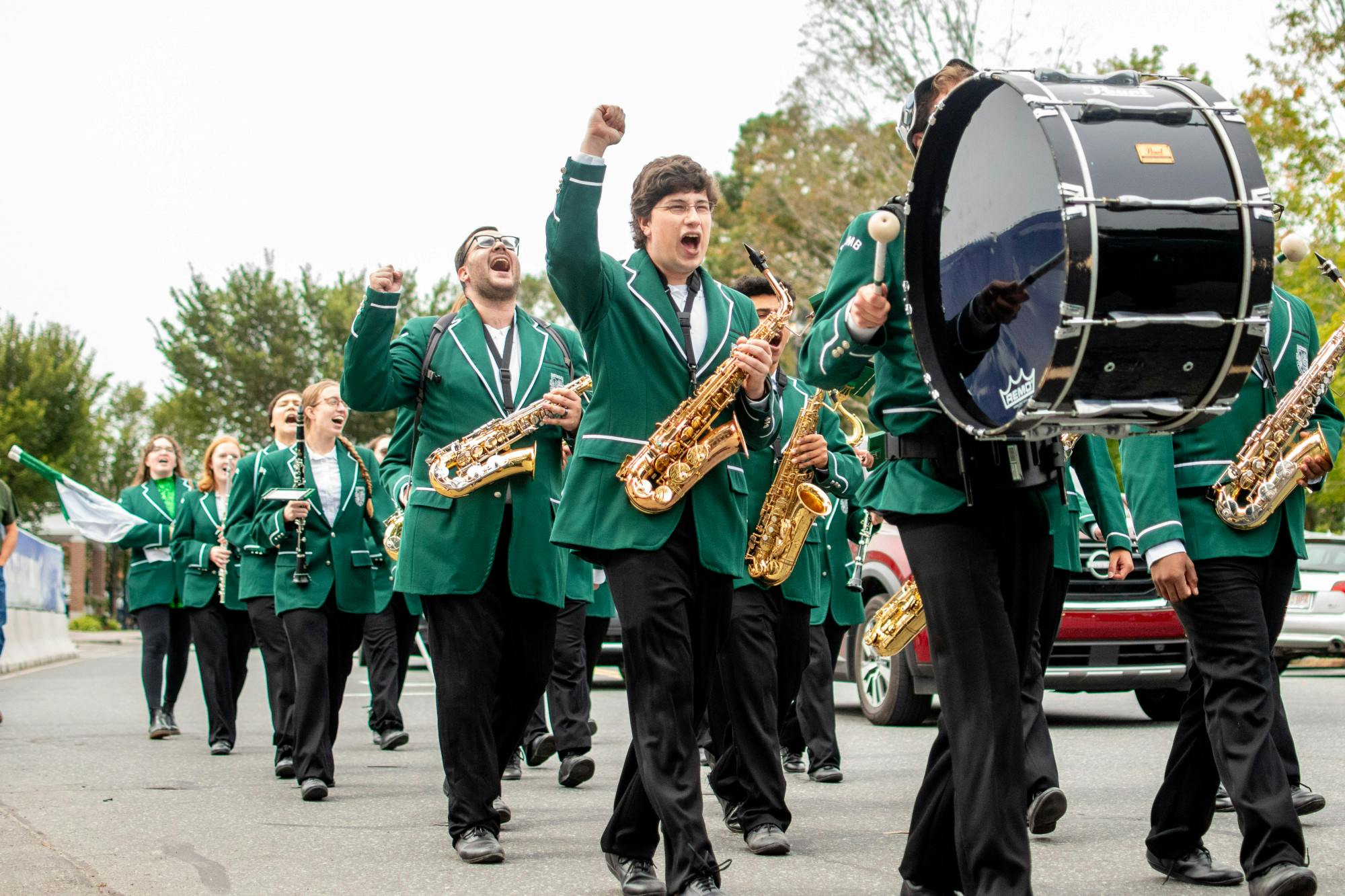This article is featured in the 2023 Homecoming special issue.
The Dartmouth College Marching Band has been a staple of Dartmouth’s tradition and culture since its formation in 1889 as the first marching band in the Ivy League. Today, it is one of a number of student performance ensembles that the Hopkins Center for the Arts runs; others include the Dartmouth Wind Ensemble, the Handel Society and the Dartmouth Symphonic Orchestra.
Since 2019, both the DCMB and the Dartmouth Wind Ensemble have been directed by Brian Messier, who led the two ensembles through the pandemic. The DCMB has grown significantly since its pre-pandemic iteration. In 2019 Messier said that the band struggled to retain 20 members. Now, four years later, the DCMB sits at around 40 members, with hopes of growing even more in the coming years.
Messier put significant effort into retaining membership through the pandemic.
“In the fall of 2020, not only was it difficult to rehearse, but the typical events we perform at either weren’t happening or were not allowing spectators,” said Messier. “So we focused on keeping the social and cultural component. We did some fundamental marching work, as well as percussion-focused stuff.”
Unlike other Hop ensembles, the DCMB welcomes students with a wide range of musical experience, and the DCMB does not require auditions for membership. The goal, Messier said, is to foster a close-knit community of students, which will continue to grow in the coming years.
The Dartmouth College Marching Band is also particularly unique in that it is largely student-run, under the direction of Messier. The band’s president Emma Wolfe ’24, vice president Nick Burke ’25, drum major Margaret Frazier ’25 and assistant drum major John Rieling ’26 comprise the “Big Four,” the main board of student leadership within the band.
The Big Four works to write the scripts that accompany the band’s performances at football games. As a “scatter band,” the DCMB gathers on the field and individual members of the band scatter across the field to form formations that correspond to a humorous script read over the loudspeaker.
Scatter Bands are now ubiquitous in the Ivy League, as every Ivy League marching band except Cornell University’s band performs according to a similar formula.
In addition to writing performance scripts, the Big Four also works to choose the band’s repertoire, incorporating a mix of Dartmouth Marching Band classics, such as fight songs, “Alma-Mater,” “Sweet Caroline, “Build Me Up Buttercup” and “Mamma Mia,” while also adding new songs from time to time, according to Wolfe.
The drum major and assistant drum major bring new song ideas to Messier, who approves new songs and determines if new pieces will fit the ensemble, noting that it helps to “have that educational knowledge, knowing what to look for when matching pieces to an ensemble.”
“Assuming pieces work, I like to let the students pick [the music],” he said. “I’m looking at it with a very different set of eyes in terms of the instrumentation.”
The band prides itself on flexibility, according to the Big Four. Right now, the band holds one “mega rehearsal,” in the words of Frazier, on Friday evenings. Friday evening rehearsals include an hour and a half of music rehearsal and a break for pizza, followed by two hours of field rehearsal.
Members have to attend the field rehearsal on Friday in order to march at weekend football games, according to Messier. However, if members are unable to make the field rehearsal, they can still play in the stands during the game.
The band performs at every home football game and tries to play at least one away football game per year. They also play at a few hockey games every year.
“It’s definitely a learning curve,” Frazier said. “The first few weeks of the fall are dedicated to teaching the freshmen what we do.”
It’s not just hard work and rehearsals that make the DCMB a tight-knit, well-oiled machine; the band also plays a major cultural role on campus, especially through its many traditions and social events.
Arguably the most important tradition, the DCMB plays at the Homecoming bonfire and invites DCMB alumni to play alongside the band at Homecoming events.
“For homecoming, in particular, we invite alumni back to join the band. That’s where I also tend to learn about traditions that are no longer in place," Messier said. “It’s really fun to hear those stories about the experiences of alumni and see how supportive and engaged they are. It’s good for me, as well as the current students.”
Non-Homecoming related traditions include playing through Baker-Berry Library after the football team wins home games and the parade through town before games. The band also holds numerous social events, geared at bringing everyone closer and fostering community, such as band dinners.
The band also holds “BandyGrams,” which are songs students can pay to have the band play for a student of their choice anywhere on campus, as a fundraiser around Valentine’s Day
While most of the Big Four also held leadership positions in their high school bands, they weren’t all certain about joining the band when they came to college. “I was in the marching band in high school, and I thought I wasn’t going to join the band in college,” Wolfe said. “But I went to the activities fair on Zoom during COVID, and [the band members] were funny and nice. It’s a great community, which got me to stick around.”
Frazier agreed: “Pretty much everybody comes to every social event. There are a lot of close relationships,” she said.
Rieling noted that the DCMB is a low-stress way to continue playing an instrument after high school without the audition process and time commitment of other performance groups.
“[Messier] always says, ‘we’re not your high school marching band,’” he said.
And, noted Rieling, the band is always looking for more trumpet players.




